The Seven "Hormonal Parrot" Dwarfs
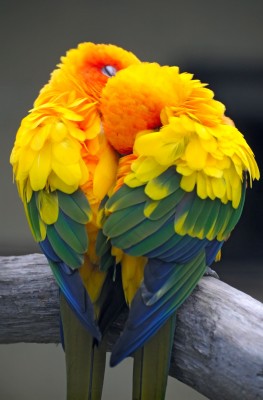 Once upon a time, in a land not so far away there lived a woman with seven dwarf parrots. All was peaceful and good until an evil magic came to the land blowing in on the warm air currents of spring. The woman's normally loving and happy dwarf parrots transformed right in front of her eyes into the seven evil hormonal dwarfs, who then came to be known as Screamy, Itchy, Plucky, Chewy, Clingy, Horny and Psycho......
Once upon a time, in a land not so far away there lived a woman with seven dwarf parrots. All was peaceful and good until an evil magic came to the land blowing in on the warm air currents of spring. The woman's normally loving and happy dwarf parrots transformed right in front of her eyes into the seven evil hormonal dwarfs, who then came to be known as Screamy, Itchy, Plucky, Chewy, Clingy, Horny and Psycho......
Does this sound familiar? Are you stocking up on band aids and ear plugs yet? Peaking around the corners in your house to make sure the coast is clear of your spouse's cute little birdie? Perhaps things don't have to look as Grimm (forgive the pun) if we try to understand what our feathered friends are starting to go through this time of year and investigate how we can make their lives (not to mention ours) a little easier. First of all, it is important to recognize that hormonal behavior is a natural behavior and it is also a temporary one. A little patience and a little knowledge will help both you and your bird.
Spring brings longer daylight hours and warmer temperatures which cue in the breeding season. Your bird's hormones are telling your bird that it is time to mate and, basically, it's out of their control. The degree of impact can vary by species, the stage of sexual maturity and the sex of the bird. Fortunately, not all parrots are slaves to the spring hormonal surge.
Recognizing the signs of hormonal behavior:
- Excessive Screaming (Screamy) -Vocalizations are normal for a parrot and they certainly can be LOUD at times. What we might think is obnoxious is completely natural and instinctual to our birds. Prolonged and intensified screaming can be the result of hormonal influence and can sometimes push even the most patient of bird owners towards the edge. For more info on how to cope with screaming, refer to our article Why Does My Bird Scream?
- Moulting (Itchy) - Moulting is the result of a hormonal process and can be a physically stressful time for a bird. During a molt, your bird's body demands a higher level of energy and nutrients. Therefore, dietary supplements may be beneficial. Making sure your bird has adequate opportunities for bathing will also help alleviate some of the itchiness factor for your bird.
- Feather Picking (Plucky) - Some birds resort to plucking especially on their chest and between their legs when breeding season arrives. The first step to take if your bird starts feather picking is to have him examined as soon as possible by your avian vet to ensure the picking is not medically related (i.e., due to malnutrition, injury or illness). Providing preening toys may distract your bird from over preening or plucking his own feathers.
- Nesting behavior (Chewy) - Is your bird crawling under the blankets and pillows, chewing everything in sight, hiding out under the furniture and/or laying eggs? If so, that's nesting behavior. Limit your bird's access to sites that may look like good nests, provide plenty of acceptable chewing outlets (destructible toys) and if your bird is laying eggs, leave them alone and supplement your bird's diet with calcium.
- Less independent (Clingy) - Suddenly the bird who has never had a problem entertaining herself wants to be with you 24/7. Providing lots of new entertaining distractions may help to mitigate this desire (i.e., foraging toys, destructible toys).
- Masturbation (Horny) - Does your bird have a joy toy in his cage or have you become the object of affection? If so, remove the toy from the cage or calmly place the bird back on his play stand or cage when they start to do the wild thing. Avoid over stimulating your bird by touching them on their back or under their wings or tail. Grabbing their beak is also a no-no. Scratching their head and neck is just fine.
- Aggressive Body Language (Psycho) - Flashing eyes, fanned tails and raised neck and crest feathers are all warning signs. When hormonal, birds tend to become very territorial and sometimes very possessive of their chosen one. Very hard bites are often the result of ignoring the warning signs. For more info, refer to our article "Understanding Your Bird's Body Language"
- Regurgitation (Barfy, OK that makes eight but who's counting) - Parrots regurgitate to feed their babies and their mates. Don't encourage this behavior as it will add to your parrot's level of confusion. If your bird tries to feed you, put him down for a few minutes or distract him with a play object or new activity.
What else you can do?
Change your bird's environment around (inside and outside the cage) to discourage nesting behavior. Remove boxes and toys from your bird's cage that may be the focus of obsession.
- Control your bird's diet to limit high calorie and high fat foods that trigger hormone production. Avoid grapes, corn, meats, sweet potatoes and instead supplement your bird's diet with more fresh veggies and lower sugar content fruits.
- Avoid feeding soft warm foods that might remind your bird of regurgitated food from a mate (oatmeal, cream of wheat, etc.)
- Control your bird's exposure to light (both natural and artificial) by making sure they get only 10-12 hours of light. A little extra sleep won't hurt them. Utilize a cage cover or blanket to darken their environment.
- Distract your bird with lots of mental jobs, exercise and environmental stimulation.
- In the case of overly aggressive behavior, be sure to supervise your bird very closely or leave them in their cage when unsuspecting visitors are around.
- As stated previously, hormones influence various species differently. Do your research and understand as much as you can about the species of birds in your home so you can more effectively meet their needs.
Armed with this new knowledge, the woman took pity on the seven little evil dwarfs, took note of and changed her own behavior and showered them with all the proper enrichments. Peace reigned again and, of course, they all lived happily ever after.........
Optional sing-a-long:
Heigh-ho, heigh-ho it's off to work we go
To make our bird's lives happier
Heigh-ho, Heigh ho
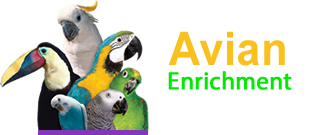


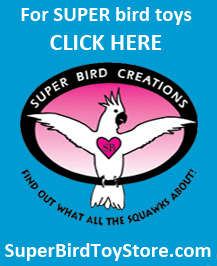
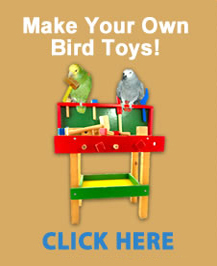
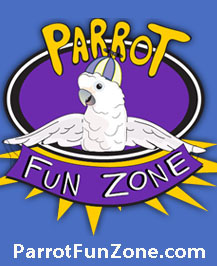
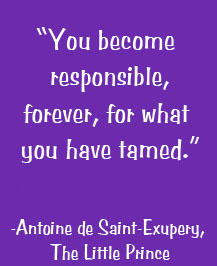
Comments powered by CComment